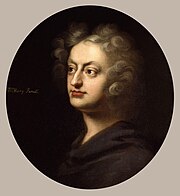
Back Дидона и Еней Bulgarian Dido and Aeneas Breton Dido and Aeneas Catalan Dido a Aeneas Czech Dido og Aeneas Danish Dido and Aeneas German Dido y Eneas Spanish Dido ja Aeneas Finnish Dido and Æneas French Dido and Aeneas Galician
| Dido and Aeneas | |
|---|---|
| Opera by Henry Purcell | |
 The composer, portrait by John Closterman, c. 1695 | |
| Librettist | Nahum Tate |
| Based on | Book IV of Virgil's Aeneid |
| Premiere | 1689 Josias Priest's girls' school, London |
Dido and Aeneas (Z. 626)[1] is an opera in a prologue and three acts, written by the English Baroque composer Henry Purcell with a libretto by Nahum Tate. The dates of the composition and first performance of the opera are uncertain. It was composed no later than July 1688,[2] and had been performed at Josias Priest's girls' school in London by the end of 1689.[3] Some scholars argue for a date of composition as early as 1683.[4][5] The story is based on Book IV of Virgil's Aeneid.[6] It recounts the love of Dido, Queen of Carthage, for the Trojan hero Aeneas, and her despair when he abandons her. A monumental work in Baroque opera, Dido and Aeneas is remembered as one of Purcell's foremost theatrical works.[6] It was also Purcell's only true opera, as well as his only all-sung dramatic work. One of the earliest known English operas, it owes much to John Blow's Venus and Adonis, both in structure and in overall effect.[6]
The influence of Cavalli's opera Didone is also apparent. Both works use the prologue/three acts format and there are similarities between, for instance, Mercury's solo in Didone and the solo "Come away fellow sailors" in Purcell's work.
- ^ "Z" refers to the Zimmerman catalogue of Purcell's works by the American musicologist Franklin B. Zimmerman
- ^ White 2009, p. 426.
- ^ White 2009, p. 417
- ^ Pinnock 2015, pp. 199–212
- ^ Wood & Pinnock 1992
- ^ a b c Price 2002